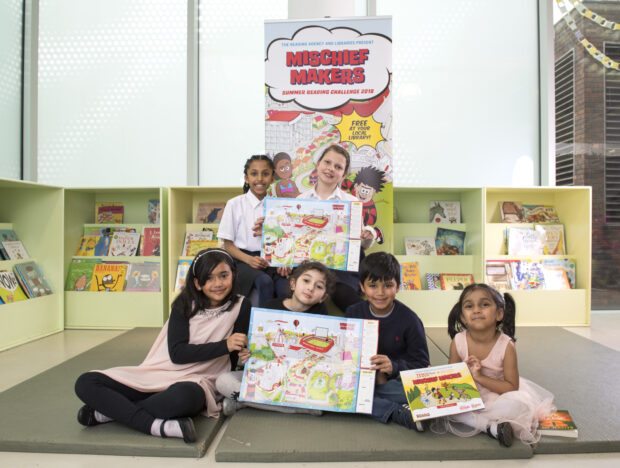 [Editor’s note: Another in the series for Libraries Week, in this short post Sue Wilkinson, chief executive of the Reading Agency writes about how the Summer Reading Challenge helps libraries deliver the literacy outcome.]
[Editor’s note: Another in the series for Libraries Week, in this short post Sue Wilkinson, chief executive of the Reading Agency writes about how the Summer Reading Challenge helps libraries deliver the literacy outcome.]
As we write this blog it’s almost the end of September. The leaves are beginning to fall from the trees; Strictly Come Dancing is back on terrestrial television screens; the Man Booker Prize shortlist has just been released; and children across the UK have been back at school for a month (or more if they’re in Scotland!)
It’s heartening to note, considering the last item on that list, that we’re still receiving daily photo updates of children joyfully receiving their certificates of completion from authorities as far apart as Stirling and Epsom, Sandwell and Sussex.

The Challenge, a large-scale initiative developed with our library partners that has now been running for over 2 decades, is designed to keep children aged 4-11 reading during the long summer holiday – a time of year during which they might not be receiving daily encouragement to do so and when their interest in books may otherwise dip. Participants are encouraged to read 6 library books of their choice – fiction or non-fiction, factual or joke, or even listen to audiobooks... all that matters is that they’re borrowed from a library.
Schools collaborate in the Challenge by inviting in library staff during the summer term. As the children progress through their books they unlock exclusive rewards while completion of all 6 books is marked with an individual certificate. The Challenge helps get 750,000 children into libraries every summer – providing tangible evidence for the continuing importance and impact of these much-loved public institutions.
Not just for the summer holidays
Of course, we hope that anyone who takes on the Summer Reading Challenge – around three quarters of a million in 2017 – will keep reading after they receive their certificate. Our Summer Reading Challenge website is designed with that in mind – our ‘Book Sorter’ tool enables a child to specify what type of reading matter they’re after and pick a book recommended by their peers.
Our activities run long after the Challenge has ended – libraries are currently preparing to promote the Winter Mini Challenge, which will begin on 1 December. Similar in format and aim to the Summer Reading Challenge, the Winter Mini Challenge encourages children to read 3 books of their choice over the winter holidays. Virtual badges and certificates await them on completion!
Although we haven’t yet received comprehensive statistics on participation from our library partners, the early numbers for 2018 are encouraging. 96% of authorities in England, Scotland and Wales participated in this year’s Challenge, which began on 14 July in England and Wales and 23 June in Scotland, (where it has been sponsored by Tesco Bank since 2011).
Mischief makers
This year’s theme was Mischief Makers, inspired by the much-loved children's comic Beano, which celebrated its 80th anniversary in 2018. Children navigated a map of iconic Beanotown, reading books, collecting stickers and hunting for buried treasure.
They were joined in their journey by thousands of young volunteers [and some slightly older volunteers - see this post from a member of the DCMS libraries team], who helped participants discover new authors and different kinds of books from ones they might otherwise read. Since it began in 2015 Reading Hack – led by young people aged 13-24 – has engaged 27,000 young people across 170 authorities.
We’re very excited that children are clearly still so enthused about the 2018 Summer Reading Challenge – there's evidently plenty more mileage in this year’s theme. At the same time, we can’t wait for next year to begin!
------------------------------------------------------------
Please note, this is a guest blog. Views expressed here do not necessarily represent the views of DCMS or the Libraries Taskforce